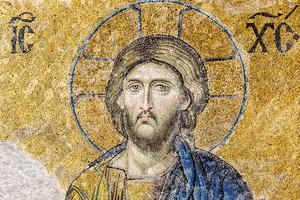Every Knee Shall Bend Before Jesus Christ, Our God and Savior
“At the time appointed by God, the only Son of the Father, the eternal Word, that is, the Word and substantial Image of the Father, became incarnate; without losing his divine nature he has assumed human nature.” (CCC 479)

As we draw near in these final days of Lent to the awful ordeal of the Lord’s Passion, we are given a number of striking intimations of what is to come. Set down in the Gospel of St. John by the Lord’s closest disciple, they provide perspective on what these last days of Lent mean. In Chapter 10, for instance (verses 31 to 42), which we read Friday of the Fifth Week, a confrontation takes place between Jesus and certain Jews bent on stoning him. It is a chilling reminder of the fate awaiting the Messiah on the other side of Palm Sunday, when the cry of Hosanna will be replaced by Crucify.
The scene described is the stuff of high drama, and on hearing the exchange we find ourselves eavesdropping on events that will surely end when the baying for blood reaches its climactic crescendo in the horror of crucifixion and death.
But for now, however, there appears to be just enough room for Jesus to maneuver — time enough even to escape. Jesus will make very shrewd use of the interval, reminding his enemies that he has shown them an abundance of good works. “For which of these,” he asks, “are you trying to stone me?”
It is a fair question, put to people for whom Christ has demonstrably done so much good already. Not to mention the promise of eternal life if only they would believe in him. Nevertheless, they persist in their perversity, doubling down, as they say, in wanting to kill him. Why is that? It is clearly not for anything he’s done that they desire his blood. Even if he had been as generous as Santa Claus in passing out presents, they’d still be driven by the kind of blood lust that only torture and death will allay. Forget the free stuff, they seem to be saying: we’re not interested. Again, what incites them isn’t anything he’s done, but rather who he claims to be; not his behavior, but his being. “We are not stoning you for a good work but for blasphemy,” they tell him. “You, a man, are making yourself God.”
It is the act of announcing himself as no less divine than God himself that will enrage the crowd. That Jesus should dare to day, “the Father is in me and I am in the Father,” is simply insupportable for men whose attitude toward the living God will not abide anyone less than God claiming an equality of importance to God. It is the worst sort of blasphemy, no greater crime than which can be imagined by a Jew of the first century. Or any century, for that matter, given Judaism’s utter refusal even to speak God’s name, so sacredly terrifying are the syllables of the Absolute Other. To arrogate to oneself attributes peculiar to God alone, is simply intolerable. Is not Jesus, after all, one of us? A mere mortal, for heaven’s sake! Where does this upstart get off ascribing divine attributes when it’s so obvious to everyone that he’s no more God than any other human being? Off with his head!
What a pity that, in their rush to pick up stones, they hadn’t bothered to canvass any of the other possibilities to account for the claim made by Christ. A shocking claim, to be sure — and if true, it would amount to the final wonder of the world. For example, was his character such that dishonesty was a commonplace practice in his dealings with others? When he said, “Before Abraham came to be, I AM,” was that evidence that he was a liar? An absolute fraud and a humbug? Or, to put it more charitably, that he was merely a lunatic, who having lost his reason could easily have entertained delusions of divinity?
If neither hypothesis will wash, then what’s left? That Jesus is exactly who he claims to be, namely, the Logos of God and you and I are to bend the knee before him.
Regis Martin, S.T.D., is a professor of theology and a faculty associate with the Veritas Center for Ethics in Public Life at Franciscan University of Steubenville, Ohio.
- Keywords:
- jesus christ

















